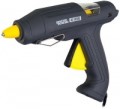Sticks length
The length of the glue stick for which the gun is designed. In fact, we are talking about the optimal length: many models allow you to charge both longer and shorter rods, but it is most convenient when the length of the consumable corresponds to the manufacturer's recommendations.
Feed rate
The maximum glue flow rate that the gun can provide is, in fact, the peak performance of the tool.
In general, indicators up to 10 g / min can be attributed to low, up to 20 g / min — to medium, more than 20 g / min — to high. The larger the scale of the planned work, the higher the glue supply rate is desirable for them; on the other hand,
high performance may be overkill in cases where little adhesive is required. However, if the tool is bought for simple household tasks, this indicator can be ignored.
Heating time
The average time it takes the glue gun to reach operating temperature (in models with multiple modes, it is usually indicated for the maximum temperature). A more “fast” tool allows you to significantly save time; on the other hand,
rapid heating significantly affects the price and power consumption.
Max operating temperature
Most modern glue sticks melt at a temperature slightly above 100 °C, and a further increase in temperature only makes sense to increase the productivity of the gun: the higher it is, the faster the melting proceeds and the more liquid the glue turns out. There are also high-temperature grades of glue, but most modern pistols are quite capable of coping with them. Therefore, when choosing according to the operating temperature, it is worth considering first of all what materials are planned to be joined. So, for paper and some fabrics, a maximum of 105 – 110 °C is allowed, and with wood,
glue guns with a high melting point(200 °C and above) can be used without problems. More detailed recommendations can be found in special sources. At the same time, do not forget that advanced tools can have several temperature modes (see below).
Number of temperature modes
The number
of temperature adjustments provided in the design of the glue gun.
The simplest models have one mode and are able to heat up only to the maximum operating temperature. The presence of several modes allows you to adjust the instrument to a specific situation; this is especially useful when working with materials that are sensitive to high temperatures. At the same time, the more modes, the more extensive the adjustment possibilities. And the most advanced option is smooth adjustment, which allows you to choose any value in the range from minimum to maximum. On the other hand, it is almost impossible to accurately set the temperature in such models, while in pistols with several fixed settings, on the contrary, each mode corresponds to a strictly defined temperature.
Functions
—
Anti-drip system. This feature prevents the adhesive from dripping when the spray gun stops working. This is implemented by moving the rod deep into the case, as a result of which it does not continue to melt further in the heated heater and does not drip onto the table, floor, etc.
—
Heating indicator. A pointer that notifies the user of the heating process. Usually, it looks like a light bulb that is on while the tool is heating up, and when the operating temperature is reached, it goes out or changes colour. This allows you to easily determine the moment when you can start work, without fear that the rod has not melted enough. The same pointer can play the role of an indicator of network connection.
—
Network connection indicator. A pointer indicating that the instrument is connected to the network. Usually performed in the form of a light bulb, which in some models also works as a heating indicator. The mains connection indication, among other things, makes it easier to identify certain problems (for example, breaks in the power cord or non-working sockets).
—
Backlight. Own lighting system — usually in the form of a small light bulb under the nozzle. This feature greatly simplifies work in low light conditions: the gun itself illuminates the gluing site, eliminating the need for the user to use external li
...ght sources.
— Detachable power cord. A mains lead that is connected to the gun using a quick-release fastener, usually in the form of a socket with a pair of pins and an appropriate plug. This feature not only makes it easier to store and transport the tool, but can also come in handy during work: if the length of the wire is not enough, and little glue is needed, the gun can be detached and quickly brought to the right place. Of course, there is no question of long-term work without a wire, but removing the tool from the cord can be more convenient than looking for another outlet, and the battery life of some models is enough for 5 to 10 minutes of work.Power cord length
The length of the power cord provided in the mains powered glue gun (see "Power Source").
This parameter is usually indicated for professional models; for domestic use, it does not really matter. In general, a long cord allows you to work away from a power outlet, but can be more inconvenient if the power source is close.

